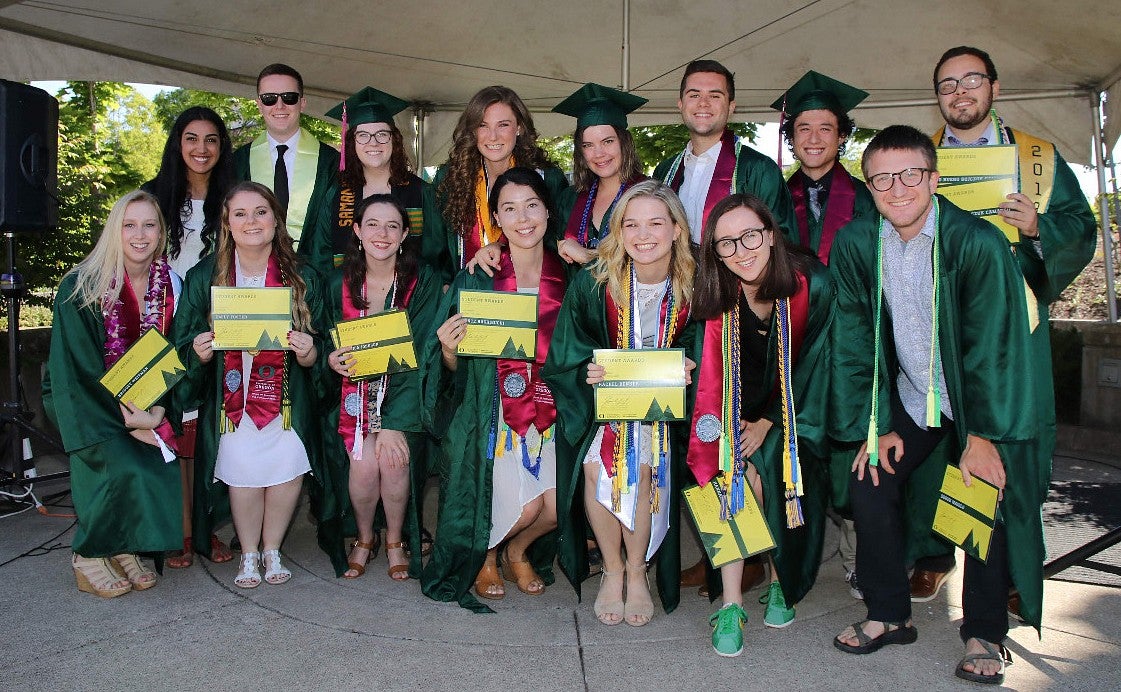
From Allen Hall to the Big Apple
In many cases, students at the Clark Honors College see the thesis as an obstacle – something that looms over them for a few years before becoming the major focus of their academic careers before graduating.
The path leading up to completing the thesis is usually paved with equal parts of hard work, frustration and joy.
But the thesis is so much more than just a final Honors College project. It can be artistic. It can be creative. And it can give students an opportunity to have a life-changing academic experience that can lead to an internship, a job, or even a career.
“The thesis is an amazing opportunity for students to grab hold of their education and make it meaningful to them,” says CHC Acting Dean Carol Stabile.
She sees dozens of students each year who improve their writing, learn communication skills and gain confidence during the thesis process. As alumni, they are more than prepared to launch into successful careers.
The CHC Post spoke with three Honors College graduates from the UO School of Journalism and Communication’s Class of 2018. All of them live in New York City. All of them have jobs in the advertising industry. And they all say their thesis projects played a role in getting their careers moving forward.
(Photos courtesy of Rachel Benner, Kyle Heiner and Hannah Lewman)
Rachel Benner
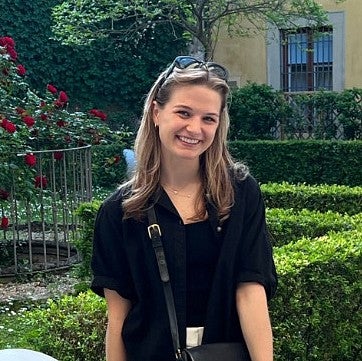
Hometown: Beaverton
Majors: Advertising and Media Studies
Current job: Team lead at the Google Creative Lab
Favorite class: SOJC honors class on media theory
Media favorite: Haruki Murakami, reading a lot of his books recently
Favorite NYC eats: Blueprint
“The thesis was a springboard into applying everything that I learned in college to this new chapter of my life.”
Rachel Benner remembers being a little nervous as she prepared herself for going off to college. The idea of diving headfirst into a large university like UO was daunting, and she even toyed with the prospect of going to a small, liberal arts college. In the end, though, she valued the opportunities and excitement UO offered.
"One reason that I chose to go to UO and the Honors College is because I had no idea what I wanted to do,” Benner says now. She enjoyed writing and joined the Daily Emerald early in her college career. She started down the journalism path and found her way to the SOJC.
The Honors College and SOJC balanced each other out, giving her a liberal arts perspective with the practical, applied experience in her majors.
“When it came time to write my thesis,” she recalls, “I really wanted to look for a topic and a process that brought those two sides together and try to design a project that let me kind of have one foot in each of those worlds.”
Inspired by a women’s studies class she took, Benner started thinking more about the intersection between culture, social movements, and corporate messaging.
She married theory and practice in her thesis, titled "Brand Activism: Working Toward Progressive Representations of Social Movements." She read up on research and brand communications, while also interviewing professionals in the advertising industry.
“I got interesting answers that sometimes contradicted what I was learning in the literature,” Benner says. “I was trying to reconcile those two sides of the equation and come out of the project with concrete recommendations about what folks in advertising could do. In retrospect, setting up those interviews was the smartest thing I have ever done.”
Although she didn’t realize it at the time, she was creating connections in the industry and networking with people who would help start her career in New York City.
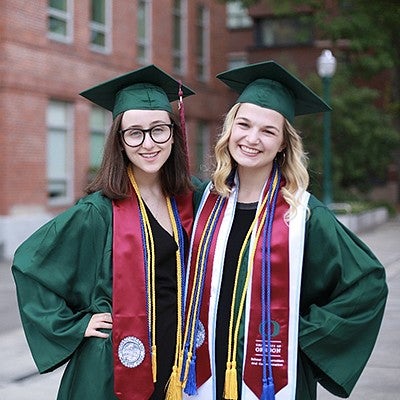
In her interviews, Benner spoke to advertising professionals about topics they were passionate about. She also shared her passions with them. Several interviews from her thesis turned into long-term connections, one of which led to a job offer at an independent creative agency in New York.
Today, she works full-time as a team lead at Google’s Creative Lab. Her work consists of collaboration with creatives, writers, producers, and other strategists. Benner’s job is to keep projects moving forward and organize the team to create cohesive work together.
“So far, my career has been a series of walking through whatever door is open at the time that I feel excited about,” she says.
Her advice for current CHC students? “Pick people’s brains and make connections,” she says. People love helping students, she adds, recommending that those who follow in her footsteps take advantage of the chance to learn from the people they hope to work with one day.
While her thesis is in her past, Benner doesn’t hesitate to emphasize its importance. “It’s been a minute since I thought too much about my thesis,” she says. “But when I do think about it, I realize how much it planted the seeds for so much of what I’ve done in the years since.”
Kyle Heiner
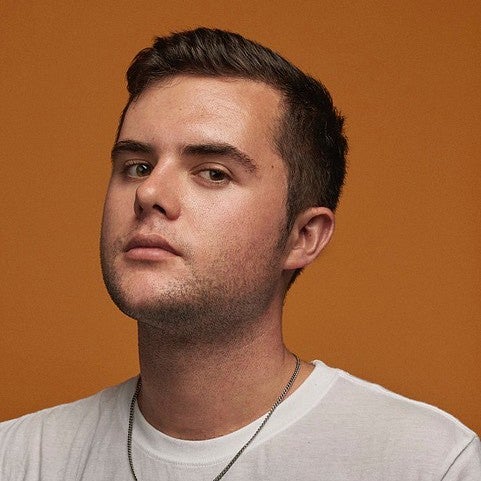
Hometown: Portland
Major: Advertising
Current job: Senior copywriter at SPCSHP
Favorite class: SOJC honors class on film criticism
Media favorites: Secret History, and all the remixes of Dua Lipa's Houdini
Favorite NYC Eats: Jajaja, Kiki's, and Gertrude's
“I think thesis showed how I was self-sufficient and a self-starter, and I was able to synthesize information.”
Kyle Heiner had long had an interest in writing when he came to UO. Filmmaking, writing novels, and working on movies were always things he dreamed of doing.
”I was an only child who was very creative and filled the world around me with my imagination,” he recalls.
But it wasn’t until he spoke to an advisor in the SOJC that he learned that advertising might be something to pursue as a career.
“I had never thought that advertising with its own industry is its own world,” he says now. “So, at that point, my mind was kind of blown and I switched into journalism and advertising.”
Heiner was a part of the UO Ad Team and Allen Hall Advertising. The groups and his advertising classes taught him about the importance of teamwork and the dynamics of navigating different work styles.
When he joined other SOJC students on an annual trip to New York that Heiner thought: “OK, I can really see myself doing this and living here.” On the trip, students met UO alumni and toured advertising agencies, giving them an inside look into the industry and what their careers might look like.
On that trip, he had the chance to hear from officials with the United Nations and learn about their 17 Sustainable Development Goals to reach by 2030. Thinking about how to communicate about climate change differently helped Heiner determine his thesis topic.
“America’s most watched show at that point was The Big Bang Theory,” he says. “So, I thought about how we could implement messaging about climate change within it that would have an effect.”
His thesis project had an immediate impact on Heiner’s break into the advertising industry, where he says it can often be hard to stand out. Although his thesis wasn’t directly related to advertising, he already knew how to use a different skill set of research and independent deadlines, and it helped land an internship.
“I think that showed how I was self-sufficient and a self-starter, and I was able to synthesize information,” he says now.
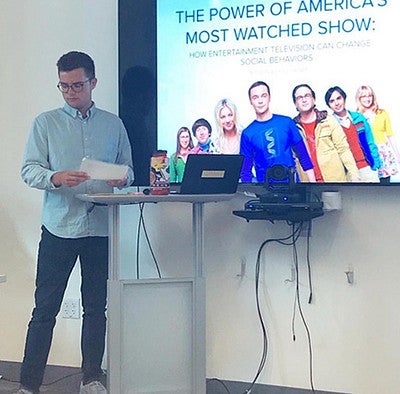
The internship also served as a transition period between being a student and professional. He worked on a project that resembled something an SOJC student might do in classes while also learning more of the day-to-day work he would be doing in the industry.
Heiner worked on a Pride campaign for Urban Decay, a makeup brand, where he considered how to make the campaign as authentic as possible. He had come out as gay about two years earlier. “I was so wide eyed and bushy tailed,” Heiner says. “I took that optimism for it while also understanding that rainbow washing exists.”
He considered all the ways he could make an impact in advertising beyond just the final product. “There are other ways beyond an ad to support gay people,” he says. “Actually hiring gay people and gay creatives” was a starting place.
Heiner says that NYC, where he’s grown his career and lived since graduating, is “a home away from home for Ducks on the East Coast.”
Hannah Lewman

Hometown: Eugene
Current job: Associate Strategy Director at Mekanism
Major: Journalism, with a concentration in advertising
Favorite class: An Honors College class on communication strategies to encourage sustainable behavior
Media favorites: A Swim in the Pond in the Rain by George Saunders
“So much of what I do is researching messaging and on what message will resonate with people and motivate them to change their behavior, which is exactly what my thesis was.”
Hannah Lewman remembers the classes she took as a kid, long before being an Honors College student. She describes them as “DIY escape room learning games,” where students would solve crime scenes set up by the coordinators.
“That’s some of my early origins of being interested in research and problem solving,” she says now.
Even before starting college or knowing what field she wanted to go into, Lewman knew a few things. “I like interviewing people,” she says. “I like going deep.”
She took courses that got her interested in science communication and being able to impact sustainable behavior changes in consumers.
She also took a history course on the different regions and cultures of the U.S. In the class, students learned about dividing the country not with state lines, but through shared cultures and values.
“I realized there's a connection here that different ways of talking about the environment would resonate differently in different regions that have very different cultures,” she says.
Her thesis, titled "Saving Polar Bears in the Heartland? Using Framing Theory to Create Regional Environmental Communications," started there, by connecting knowledge and skills in a way that doesn’t normally happen in a classroom. “Those are two different parts of my life and brain, and being able to connect those I think is a unique thing about the thesis,” Lewman says.
This skillset directly translated into Lewman getting an internship – connecting a granola bar company with a national parks program to make a meaningful message. Years after working on that account, the kind of work she did on her thesis still impacts her day-to-day responsibilities as a strategist in her current job at Mekanism, an advertising agency.
“So much of what I do is researching messaging and what messages will resonate with people and motivate them to change their behavior,” she says. “Which is exactly what my thesis was.”
She gets to spend a few months immersing herself in a subject or brand, learning all aspects of it. She does interviews and focus groups, talking to people about their lives and making connections.
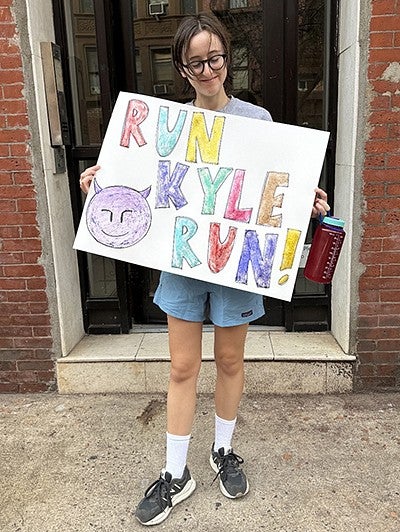
“You know, sometimes the product isn't even that interesting, but the life that surrounds it always is,” she says.
Lewman’s career blends storytelling with analysis and using creativity that’s informed by data.
Her path wasn’t easy right out of college. She began her internship immediately after graduation. “I hopped on a plane, flew across the country, moved into a tiny sublet, and I’ve been here ever since,” she says.
But when her internship didn’t turn into a full-time position, Lewman had a stressful couple of months finding work, new housing, and trusting herself. “It was a moment of: ‘OK, I gotta bet on myself that I will be able to crack it here. I’m not going to give up and go home,’” she remembers thinking at the time.
As she looks back on college and the start of her career, she recommends that current students take the time to find a topic for their thesis that excites them and that they’re passionate about. She compares researching her thesis as her “new favorite show,” something that she not only had to, but wanted to tune into.
“I am proud of my thesis, and it’s an interesting topic,” she says. “But oh, I wish I could go back and do it again.”
